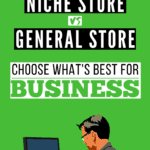The end of our beloved 2018 is near and the Shopify eCommerce business is alive and well as never before. Statistics show that 80% of Americans with internet access made an online purchase in the past month alone. Now is the time to go all in and absolutely crush it with your online Shopify store. If you don’t have a store and want to start one for free then click here. This article is about choosing a Shopify niche for your store.
Click here to join Shopify and get a 14 day free trial!
To learn more about dropshipping with Shopify, read the article here. If you don’t have a store and want to start one then click here.
I have been guiding many people in my Facebook group through their eCommerce journey this past year and their results have been nothing short of amazing! However, there are still plenty of the group members who message me every single day with one question:
Should they start with a general store or go niche?
There are many advantages and disadvantages to both models. I think nothing less than a full-scale, comprehensive comparison of the two would make for an adequate enough answer.
Also, even if you have already built your first store(s) and have seen some initial profits, I still encourage you to read this article in its entirety.
It will contain much valuable information on both how you can:
- Market your existing store better by knowing all the ins and outs of your current model
- Find motivation to start another store and make your success even bigger
I have been working as a digital marketing specialist for the last seven years. Paid advertising and organic traffic play such a huge role in the eCommerce world and I only see fit that I approach the topic from a purely marketing standpoint. That way I can give you a valuable insight into what model is easier to market, as well as some guidelines for how to do it most effectively throughout the upcoming 2018 holiday season.
So let’s dive right in!
Niche Store vs. General Store What Is the Difference?
In order to decide which direction to go in with your new eCommerce business, we first have to know what those directions are. Let’s start with a niche store.
Niche Stores: Shopify Niche
A niche store is an online store specialized in selling one particular type of products or services.
Niches can be very narrow or very broad as well as somewhere in between.
Broad Niche
An example of a broad niche would be a store selling accessories for men. They might offer everything from phone cases, bracelets and necklaces all the way to ties and cufflinks. Put simply, they have chosen the industry segment that they want to be in (their niche) as men’s accessories and apparel.
Narrow Niche: Shopify Niche
An example of a narrow niche might be a store specialized in selling raincoats for German Shepherds. They first decided they wanted to sell raincoats for dogs and that was a niche there already. But then they went even deeper and made their niche narrower by not offering products for every dog breed, but rather only to serve customers with German Shepherds as pets.
Now that we know what a niche store is, it will be much easier to define a general store.
General Stores
A general store is an online store offering different types of products and services, most often from various industry types. In other words, it does not specialize in selling one particular product type like in our two previous examples. Instead, it offers plenty of different kinds.
A general Shopify store might be selling everything from gadgets and clothing to home appliances and jewelry at the same time.
Click here to join Shopify and get a 14 day free trial!
A very good example of a general store everybody should be familiar with is Wish.com. It was founded back in 2011, but today, they list more than 200 million different items from various categories on their site and have more than 75 million active monthly users.
Pros and Cons of Each Store Type: Shopify Niche
Great! Now that we know very well what each model is and how they work, it’s time for the fun part. Let’s fully analyze both models and see what the pros and cons of each are with regard to digital marketing.
Niche Store Pros: Shopify Niche
Since it’s much more specialized in what it does, niche stores are a great choice for those who wish to completely dominate their chosen market segment both in terms of your (local) market share and revenue.
#1 SERP Ranking and Positioning
It’s no secret that Search Engine Optimization (SEO) plays a huge role in digital marketing nowadays. This especially holds true for eCommerce businesses since their whole model is based online. It is only natural that the internet be their primary traffic source.
And what better traffic than free traffic?
Just to make sure, I am talking about organically ranking your site as high as possible on all the major Search Engine Results Pages (SERPs). This includes Google, Yahoo and Bing.
I am not talking about PPC (pay-per-click) campaigns as those are not the point here.
If you own a niche store and therefore only serve a particular type of customer, you will have a much easier time optimizing your site’s content for better SERP ranking.
Most on-site SEO processes revolve around creating well-written, quality content on a particular topic. You should only specialize in one area/industry segment since it will help you tremendously to focus your efforts on this single aspect.
Take into account that 50% of all Google searches contain four or more words (which means that 50% of people know exactly what they are looking for). The first three listings on Google get more than 40% of clickthrough traffic.
So that’s pro #1 – niche stores are much easier to optimize for free organic traffic due to their highly specific nature.
#2 More Filtered Traffic
There is another very good thing about going niche. You can literally pinpoint your target audience. In other words, since you’re selling just one particular kind of product, you know exactly who would benefit the most from it.
This means that you won’t be getting as much cold traffic (people that are not interested in what you have to offer) than would be the case if you were advertising a general store.
It all occurs because the store easily ranks on both search and social platforms and attracts only those who are really interested in the niche, i.e. mostly your ideal customers.
#3 Easier to Convert Visitors
It is safe to assume that the majority of traffic coming to your site is there because they are actually interested in what you’re selling and not because they are just browsing your offer (as would oftentimes be the case with general stores).
Several things will happen.
The already existent buying intent will facilitate making conversions. If someone visits your site, it is more than likely they are willing to make a purchase. If your site is well-optimized, it shouldn’t take a lot of effort to make them initiate the checkout.
A simple Call To Action (CTA) or an enticing offer should do the trick.
Niche stores are also known to receive a greater number of orders than a general store, especially if they succeed in getting a lot of traffic (be it free/organic or paid) to the site.
Niche Store Cons
Since no business model can be called perfect, there are of course some drawbacks to running an eCommerce niche store.
Here are some of the more important ones.
#1 Niche Stores are Not Beginner Friendly: Shopify Niche
A lot of people already in the eCommerce business will advise you never to start with a niche store, especially if it is your first time building and managing an online store.
There are a few reasons behind this:
- The most important of them being that picking a niche with good potential is hard.
- Making your niche business profitable can, in some circumstances, be even harder.
Since you may have little to no previous experience in online selling or in marketing, choosing a product to sell that will constantly bring revenue could be quite a challenge.
There are many guides and tutorials available online that can aid you in this task and show you exactly how to find what they call a winning product (a product that will sell well and generate substantial profit).
Tread very carefully because if you choose wrong, you will either have to completely redesign your entire store to try with a new product. Also, you may create a whole new store with a new domain name since the old one will most probably be tightly connected to your old niche.
Click here to join Shopify and get a 14 day free trial!
#2 Niche Stores Require Plenty of Testing
In a general store you would be selling multiple (or rather many) various products and/or services, some or at least one of which should have the potential to make you money.
You really have no such option with a niche store.
After having picked a product you will be selling, there is almost no going back.
Either you won, or you lost.
From a statistical standpoint, there is a big chance you will not get it right from the get-go, so you will most probably end up having to test at least a few different products before you find the one you will go with.
Be cautious though, if you don’t see any sales in your first few days of running the store, it doesn’t necessarily have to mean that your products are bad. You might have messed up with your marketing strategy, your site design, or there might be some other external reason you are not getting any conversions.
#3 Niches Have a Highly Unstable Growth Curve: Shopify Niche
Just like the trends go up and down, the same thing will more than likely happen with your niche eCommerce business.
Since you have no way of knowing how well the product you have chosen will behave within your market segment in terms of popularity and relevance (the two most prominent factors in making impulse buying decisions at the core driving force behind eCommerce), you might experience a greater amount of alternating profits and losses.
This means that although you might have been making decent money for the last two months, it is in no way of guarantee of how you will be doing in the following month.
That’s all relatively speaking, of course, since having a proper marketing strategy in place does actually help to stabilize and predict business growth, but that is far out of the scope of this article.
General Store Pros
We will now take a look at all the positives and the negatives of running a general eCommerce store.
Since they are generally more flexible in what you can do and offer with them, you can be certain that you will reach a much wider audience with your advertising and that should be used to your advantage.
But is it all milk and honey with general stores? Let’s find out!
#1 Flexibility and Simplicity
General stores do not require you to focus on a single niche, but are rather a collection of different niches. This opens up so many opportunities for reaching plenty of different audiences.
Because of this, less preparation and market research is needed prior to building and launching the store.
This results in more time available for analyzing and determining your ideal buyer persona (a demographic and psychological profile of a person most likely to buy your product).
This will be very important later on when you start paid advertising.
The greatest benefit of a general store’s flexibility is the possibility to choose a couple of the most trending products from multiple niches and then integrate all of them into your eCommerce store.
Click here to join Shopify and get a 14 day free trial!
#2 Wider Reach
Due to the fact that your offer encompasses products from multiple industries, you will naturally have multiple different target audiences to advertise to. You will have at least one per each category of products.
You will not only be serving marginally different ad creatives to the same audience as you would with a niche store, but will spread the delivery amongst various audience groups.
This will in turn allow for better ad optimization and more potential buyers (leads).
Remember though, more leads does not automatically mean more revenue because there are a lot of factors that go into proper conversion rate optimization (CRO), including making your website look professional and trustworthy.
You can also optimize each category listing page (CLP) for better SERP ranking as was explained earlier so you also get some free traffic from people interested in the Shopify niche of a specified category you offer.
#3 Asses Multiple Niches At Once
Even if not all of your product categories (niches) sell well, since you have many more, there is a high likelihood of at least a couple of them being profitable.
What you can do from there is then either:
- Focus most of your efforts and marketing on those niches that sell well within your general store in order to either break even (if your other niches are losing you money for some reason) or scale that segment of your store vertically. This basically just means adding some more products of the same type and raising your advertising budget.
- Build and launch a brand new Shopify niche store concentrating exclusively on that Shopify niche you have found brining decent return on investment (ROI).
General Store Cons
By the looks of it, a general store seems really easy and simple to run. It also seems to allow for great revenue to be made if managed correctly. So are there any disadvantages to running a general store?
Of course there are!
#1 Low Conversion Rates
Unlike with a Shopify niche store, visitors to a general store do not usually know what they are searching for.
To be brutally honest here, most often they are actually not searching for anything. They are just browsing your site to see what kinds of products you offer.
Put differently, general store visitors lack a buying intent at the core factor leading to converting someone into a customer/buyer.
This means that a lot of work will have to go into carefully crafting the design of your website, making sure every category and product listing are easily accessible as well as that all the product names and descriptions are well-written with high-quality images representing them.
Much more CRO is involved in working with general stores than it is the case with Shopify niche ones.
#2 High Amount of Relevant Traffic
You offer many different products that you have to target many different people to deliver your ads to.
The problem arises because the more people you target, the more inaccurate your targeting criteria becomes. This inevitably results in showing your ad to a lot of people who have no interest at all in anything you might have to offer them.
This wouldn’t be a big issue per se, but if you’re not careful enough, it can (and very often does) fiddle with your analytics especially your click-through-rate (CTR the percentage of people who have clicked on your ad out of all those who have seen it), which is one of the most important indicators of the current state of your marketing efforts.
This can be partially dealt with using techniques such as lead filtering or customer segmentation, but those concepts are yet again out of the scope of this article.
#3 More Competition
Maybe the most prominent characteristic of general eCommerce store is market saturation.
In other words, due to them being more simple to manage, most people nowadays begin their eCommerce journey by starting a general store.
Since at every given moment there is a limited pool of trending products to choose from and taking into account that most people do at least some research beforehand, you have to be aware of the fact that, provided you decide on a general store. There will most likely be other business owners selling the same products to the same people as you.
Depending on how you approach this situation, this can either be a good thing and something you can benefit from or it can be something that will put you out of business before you were able to pronounce ‘dropshipping’.
In case you find a perfect marketing strategy (or hire someone to devise one for you) for your general store and somehow manage to outperform your competition, you are standing to make a pretty nice profit.
If, on the other hand, you fail at implementing proper marketing moves, then your competition gets all the lemonade and you, if you’re lucky, might walk away with squashed lemons.
Conclusion What Model to Choose for 2018 Holidays
Now that we finally have all the facts down and know exactly what the pluses and minuses of each business model are, it’s time to return to the reason why you are probably reading this article in the first place.
Should you build a Shopify niche store or a general store to make more profit during the 2018 holiday season?
Much like everything else in life, neither Shopify niche nor a general store are perfect business models. They both offer great opportunities in terms of generating revenue, but also come with certain disadvantages.
While a Shopify niche store allows for much more precise targeting and less on-site optimization is required, it can be either a hit or a miss, but is rarely both.
A general store, however, is more suitable for beginners due to its relative simplicity and requires less time having to be put into product and market research, but can sometimes be tricky when it comes to audience targeting and especially scaling (growing the business and increasing revenue).
Nonetheless, with eCommerce compensating for almost 10% of total sales volume in the US in Q4 (October-December period) and more than $200B in sales revenue, there is no doubt about money ready to be made by the end of the year.
If you are new to eCommerce (and even if you’re not), I would advise starting with a general store for this year’s holiday season.
Here are a couple of reasons for that:
- Christmas is only a month and a half away, but Black Friday and Cyber Monday are literally around the corner. People go crazy with desire to purchase something (just because everybody else is doing it) during this period so you should use that to your advantage and make them buy from you. And make them buy a lot.
- You don’t really have time for testing a couple of different niches to see which one might bring you success. Oh, wait! That is exactly what you can do it with a general store!
- People are not really smart when it comes to buying gifts for others and since the season of gift-buying has only just started, you should be the one to show them that perfect present their son or nephew most certainly deserves.
- General stores often times have a larger average order value (AOV), which means that even with a fewer customers you can potentially be generating much more profit per customer than you would be able to do with a Shopify niche store.
Now that you are fully equipped with knowledge about how to start your eCommerce journey and even where to start it, don’t keep on waiting and let everybody else take your piece of the pie. Go out there and crush it!
Happy hustlin’!
**Affiliate links present for Shopify, a brand I trust.
Editor’s Note: This article was originally titled “Shopify Niche vs. General Store – The Ultimate Guide For 2018 Holidays”. It is by Josip Cvrtila, our guest blogger today. He is a marketing guru that I know from a Facebook Shopify group and here is his LinkedIn to learn more about him.












Assignment Help says
Great work did by you. Informative and problem-solving content that users can easily digest can work for all types of blogs. When a user finds something informative on a blog, he/she is more likely to come back from your side.
Academic Writing Service
air jordan 4 says
you’ve got a fantastic weblog here! would you prefer to make some invite posts on my weblog?
Becky says
Thanks! At this time, I am not guest posting but check back in the Fall.
Miller Smith says
Amazing article….. .this helps me to make money $100 per day… very very thanks for sharing. I am very glad u…. I share The 5 Step Framework I Used To Help My Students “Go From Zero” To Selling Over $31 Million in Products click http://bit.ly/2VezwLX
stephen micheal says
This page is very helpful to me. Thank you really for putting up this one!
Reply
Creamfields says
Hey!
Great post. Thought that I’d leave a comment…
Thanks for taking your time to write this post and share your knowledge with us.
Becky says
Thank you!